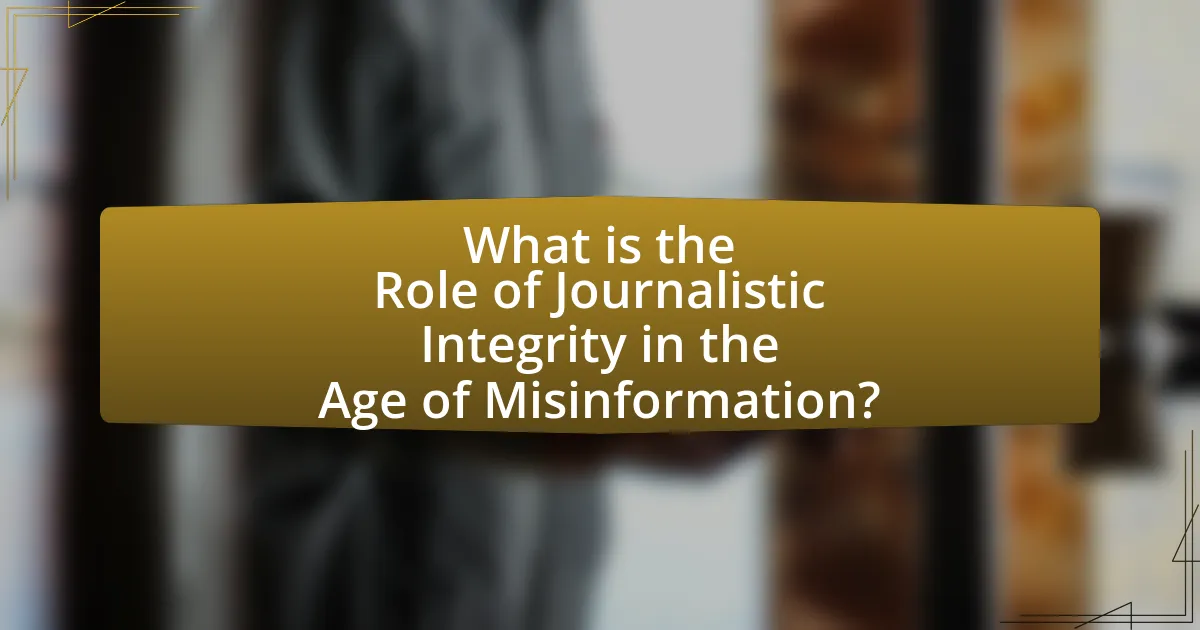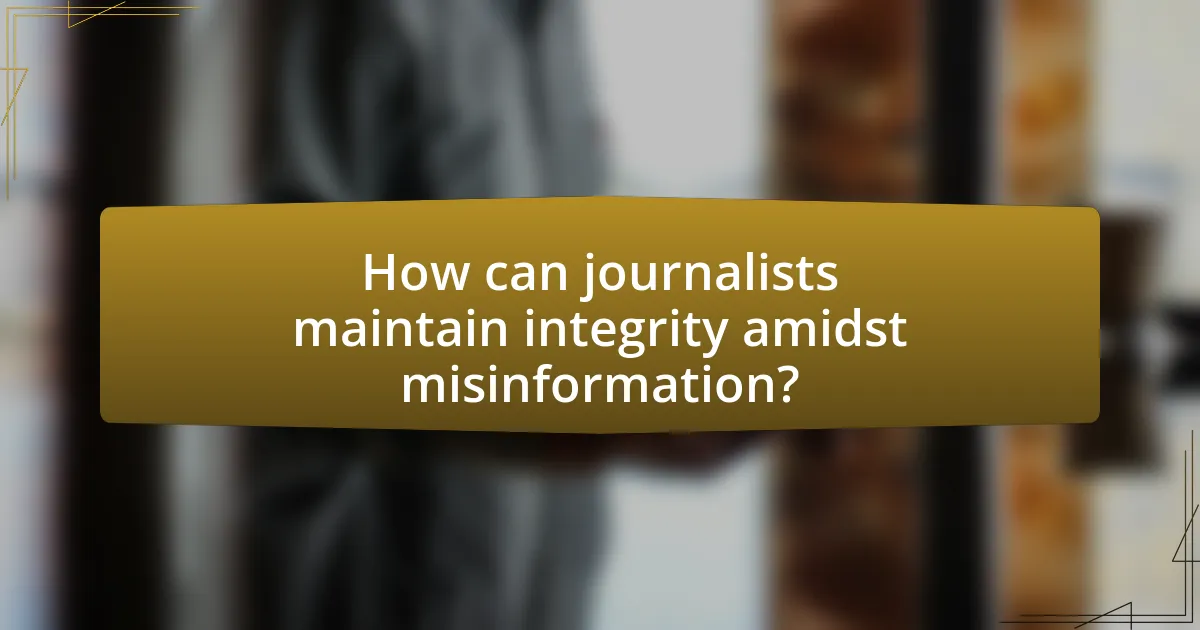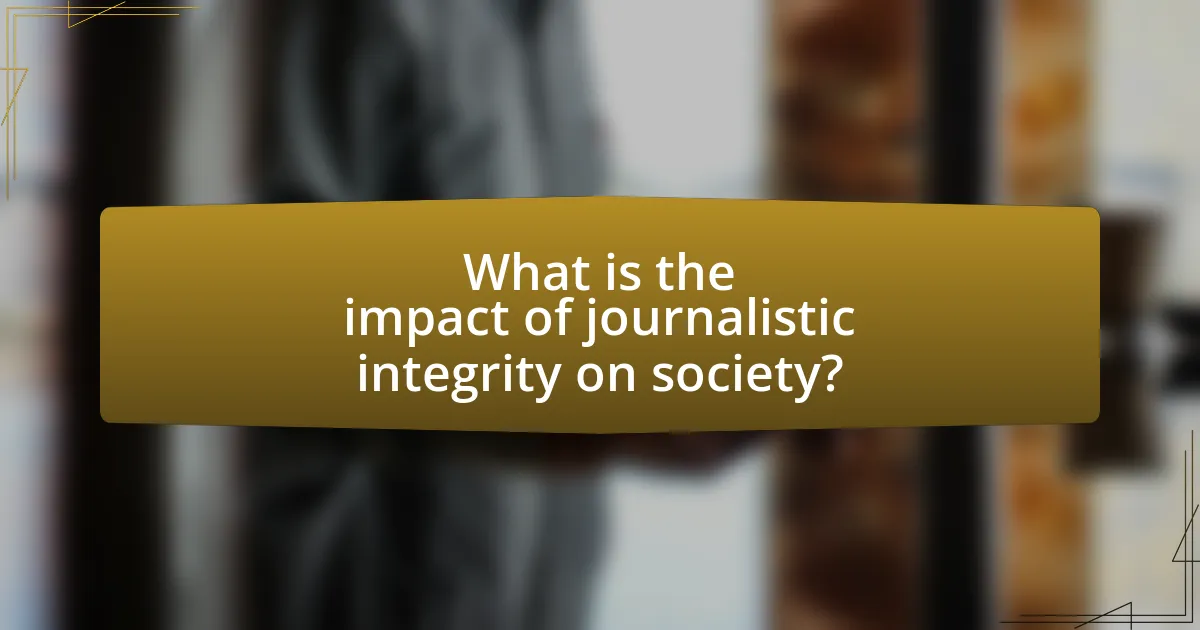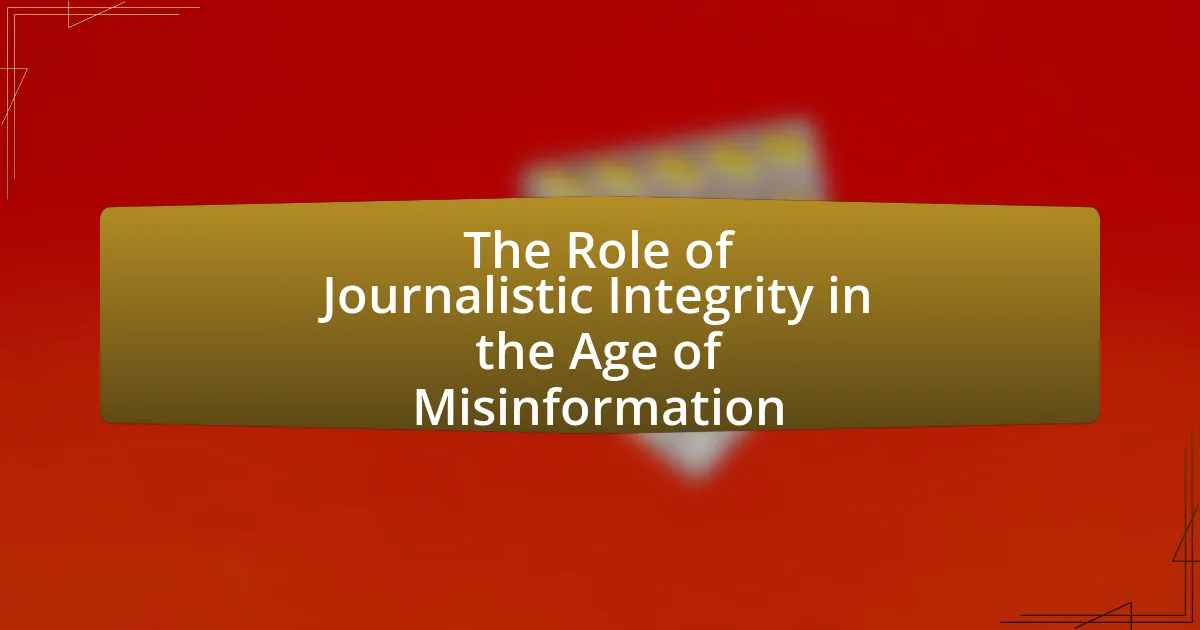Journalistic integrity is essential in combating misinformation, ensuring that news is reported accurately, fairly, and ethically. This article explores the critical role of journalistic integrity in today’s media landscape, emphasizing its importance for public trust and informed discourse. Key principles such as accuracy, fairness, independence, accountability, and transparency are discussed, along with the challenges journalists face due to the rapid spread of misinformation, particularly through social media. The article also highlights strategies for maintaining integrity, including rigorous fact-checking and source verification, and examines the broader impact of journalistic integrity on society and democracy.

What is the Role of Journalistic Integrity in the Age of Misinformation?
Journalistic integrity serves as a critical safeguard against the spread of misinformation by ensuring that news is reported accurately, fairly, and ethically. In an era where false information can proliferate rapidly through digital platforms, journalists are tasked with verifying facts, providing context, and maintaining transparency in their reporting processes. For instance, a study by the Pew Research Center found that 64% of Americans believe that misinformation is a major problem, highlighting the necessity for journalists to uphold integrity to foster public trust and informed discourse. By adhering to ethical standards, journalists can combat misinformation effectively, thereby reinforcing their role as reliable sources of information in society.
Why is journalistic integrity crucial in today’s media landscape?
Journalistic integrity is crucial in today’s media landscape because it fosters trust between the media and the public, which is essential for a functioning democracy. In an era marked by rampant misinformation and disinformation, credible journalism serves as a reliable source of information that informs public opinion and decision-making. According to a 2021 Pew Research Center study, 64% of Americans believe that news organizations are often influenced by powerful interests, highlighting the need for transparency and ethical standards in reporting. Upholding journalistic integrity ensures that news is accurate, fair, and independent, which is vital for maintaining an informed citizenry and combating the spread of false narratives.
What are the core principles of journalistic integrity?
The core principles of journalistic integrity include accuracy, fairness, independence, accountability, and transparency. Accuracy ensures that information is correct and verified before publication, which is essential in maintaining trust with the audience. Fairness involves presenting all sides of a story without bias, allowing for a balanced perspective. Independence refers to the journalist’s ability to report without influence from outside parties, ensuring that the news is free from conflicts of interest. Accountability means that journalists must take responsibility for their work and correct any errors promptly. Transparency involves being open about sources and methods, which fosters trust and credibility. These principles are vital in combating misinformation and upholding the standards of journalism in today’s media landscape.
How does journalistic integrity influence public trust?
Journalistic integrity significantly influences public trust by ensuring that news is reported accurately, fairly, and ethically. When journalists adhere to principles such as fact-checking, transparency, and accountability, they build credibility with their audience. Research from the Pew Research Center indicates that 62% of Americans believe that news organizations should be held accountable for their reporting, highlighting the importance of integrity in fostering trust. Furthermore, a study published in the Journal of Communication found that audiences are more likely to trust media outlets that demonstrate a commitment to ethical standards, reinforcing the idea that integrity is essential for maintaining public confidence in journalism.
What challenges does journalism face in the age of misinformation?
Journalism faces significant challenges in the age of misinformation, primarily due to the rapid spread of false information and the erosion of public trust. The proliferation of social media platforms allows misinformation to circulate widely and quickly, often outpacing fact-checking efforts by journalists. According to a 2020 study by the Pew Research Center, 64% of Americans believe that fabricated news stories cause confusion about the basic facts of current events. This environment complicates journalists’ ability to provide accurate reporting, as they must compete with sensationalized and misleading content that attracts more attention. Furthermore, the decline in traditional media revenue has led to reduced resources for investigative journalism, making it harder to combat misinformation effectively.
How has the rise of social media impacted journalistic integrity?
The rise of social media has significantly compromised journalistic integrity by facilitating the rapid spread of misinformation. Social media platforms allow unverified information to circulate widely, often leading to the prioritization of speed over accuracy in news reporting. A study by the Pew Research Center found that 64% of Americans believe that fabricated news stories cause confusion about the basic facts of current events. This environment pressures journalists to publish quickly, sometimes at the expense of thorough fact-checking, which undermines the credibility of news organizations. Furthermore, the algorithms used by social media platforms often promote sensational content, further distorting the public’s perception of reliable journalism.
What are the consequences of failing to uphold journalistic integrity?
Failing to uphold journalistic integrity leads to a loss of public trust in media outlets. When journalists disseminate false information or exhibit bias, it undermines their credibility and the overall reliability of news sources. According to a 2021 Pew Research Center study, 57% of Americans believe that news organizations are often influenced by political bias, which can result in decreased audience engagement and increased polarization. This erosion of trust can also lead to a decline in readership and viewership, ultimately threatening the financial viability of media organizations.

How can journalists maintain integrity amidst misinformation?
Journalists can maintain integrity amidst misinformation by adhering to rigorous fact-checking protocols and verifying sources before publication. This commitment to accuracy ensures that the information disseminated is credible and reliable. For instance, the Poynter Institute emphasizes the importance of cross-referencing multiple reputable sources to confirm facts, which helps mitigate the spread of false information. Additionally, journalists should be transparent about their sources and methodologies, fostering trust with their audience. By prioritizing ethical standards and accountability, journalists can effectively navigate the challenges posed by misinformation while upholding their professional integrity.
What strategies can journalists employ to combat misinformation?
Journalists can employ fact-checking, source verification, and transparency as key strategies to combat misinformation. Fact-checking involves rigorously verifying claims before publication, which helps ensure accuracy; for instance, organizations like PolitiFact and FactCheck.org have demonstrated the effectiveness of this approach by debunking false statements and providing context. Source verification requires journalists to confirm the credibility of their sources, thereby reducing the likelihood of spreading false information; studies show that misinformation often originates from unreliable sources. Transparency in reporting, including disclosing the methods used to gather information and the potential biases involved, fosters trust with the audience and encourages critical evaluation of the information presented. These strategies collectively enhance journalistic integrity and contribute to a more informed public.
How can fact-checking enhance journalistic integrity?
Fact-checking enhances journalistic integrity by ensuring the accuracy and reliability of information presented to the public. When journalists rigorously verify facts before publication, they reduce the spread of misinformation, which is crucial in an era where false narratives can easily proliferate. A study by the Pew Research Center found that 64% of Americans believe that misinformation has a significant impact on public opinion, highlighting the need for trustworthy journalism. By committing to fact-checking, news organizations build credibility and foster public trust, which are essential components of journalistic integrity.
What role does transparency play in maintaining integrity?
Transparency is essential for maintaining integrity as it fosters trust and accountability in communication. When journalists openly disclose their sources, methods, and potential conflicts of interest, they enable audiences to critically evaluate the information presented. Research indicates that transparency in reporting can significantly enhance public trust; for instance, a study by the Pew Research Center found that 70% of Americans believe that transparency about sources is crucial for credible journalism. This connection between transparency and integrity is vital, especially in an era marked by misinformation, as it empowers audiences to discern fact from falsehood.
How can media organizations support journalistic integrity?
Media organizations can support journalistic integrity by implementing strict editorial standards and promoting transparency in their reporting processes. Establishing clear guidelines for fact-checking and sourcing information ensures that journalists adhere to high ethical standards, which is crucial in combating misinformation. For instance, the American Press Institute emphasizes the importance of transparency, stating that organizations should disclose their sources and methodologies to build trust with the audience. Additionally, providing ongoing training for journalists on ethical reporting practices reinforces the commitment to integrity, as highlighted by the Society of Professional Journalists, which advocates for continuous education in ethical journalism.
What policies should be implemented to uphold ethical standards?
To uphold ethical standards in journalism, policies such as mandatory fact-checking, transparency in sourcing, and adherence to a code of ethics should be implemented. Mandatory fact-checking ensures that all information disseminated is accurate and verified, reducing the spread of misinformation. Transparency in sourcing requires journalists to disclose their sources, which fosters trust and accountability. Adherence to a code of ethics, such as the Society of Professional Journalists’ Code of Ethics, provides a framework for ethical decision-making and reinforces the commitment to integrity in reporting. These policies collectively enhance journalistic credibility and protect the public from misinformation.
How can training and education improve journalistic practices?
Training and education can significantly improve journalistic practices by equipping journalists with essential skills and ethical standards necessary for accurate reporting. Comprehensive training programs enhance critical thinking, fact-checking abilities, and understanding of media ethics, which are crucial in combating misinformation. For instance, a study by the Pew Research Center found that journalists who undergo formal training are more likely to adhere to ethical guidelines and produce reliable content. Additionally, ongoing education helps journalists stay updated on technological advancements and evolving media landscapes, further ensuring the integrity of their work in an era rife with misinformation.

What is the impact of journalistic integrity on society?
Journalistic integrity significantly impacts society by fostering trust in media, which is essential for informed public discourse. When journalists adhere to ethical standards, they provide accurate, unbiased information that enables citizens to make educated decisions. For instance, a study by the Pew Research Center in 2021 found that 65% of Americans believe that news organizations should be held to high ethical standards, indicating a societal expectation for integrity. This trust in journalism is crucial, especially in the age of misinformation, as it helps combat false narratives and promotes accountability among public figures. Thus, journalistic integrity not only shapes public perception but also strengthens democratic processes by ensuring that citizens have access to reliable information.
How does journalistic integrity affect public discourse?
Journalistic integrity significantly enhances public discourse by ensuring the accuracy and reliability of information disseminated to the public. When journalists adhere to ethical standards, they provide fact-checked, unbiased reporting that fosters informed discussions among citizens. For instance, a study by the Pew Research Center found that 62% of Americans believe that news organizations should be held accountable for the accuracy of their reporting, indicating a strong public expectation for integrity in journalism. This accountability helps to build trust in media sources, which is essential for a healthy democratic society where informed debate and decision-making can occur.
What role does integrity play in shaping informed citizens?
Integrity is crucial in shaping informed citizens as it fosters trust in the information provided by journalists. When journalists adhere to ethical standards and present accurate, unbiased information, citizens are more likely to rely on that information for decision-making. Research indicates that trust in media correlates with higher levels of civic engagement and informed public discourse. For instance, a study by the Pew Research Center found that 62% of Americans believe that news organizations should be held to high ethical standards, which directly influences their perception of news credibility. Thus, integrity in journalism not only enhances the quality of information but also empowers citizens to engage meaningfully in democratic processes.
How can integrity in journalism contribute to democracy?
Integrity in journalism contributes to democracy by ensuring that the information disseminated to the public is accurate, unbiased, and trustworthy. This integrity fosters an informed citizenry, which is essential for democratic participation and decision-making. For instance, a study by the Pew Research Center found that 62% of Americans believe that news organizations should be held accountable for the accuracy of their reporting, highlighting the public’s expectation for integrity in journalism. When journalists adhere to ethical standards, they help to combat misinformation, thereby strengthening democratic processes by enabling citizens to make informed choices based on reliable information.
What are the best practices for journalists in the age of misinformation?
Journalists should prioritize fact-checking and source verification as best practices in the age of misinformation. This involves rigorously confirming the accuracy of information before publication, utilizing reliable sources, and cross-referencing data with multiple credible outlets. According to a study by the Pew Research Center, 64% of Americans believe that misinformation is a major problem, highlighting the necessity for journalists to uphold high standards of accuracy and transparency. Additionally, journalists should engage in media literacy initiatives to educate the public about identifying misinformation, thereby fostering a more informed audience.
How can journalists effectively verify sources and information?
Journalists can effectively verify sources and information by employing a systematic approach that includes cross-referencing multiple credible sources, utilizing fact-checking organizations, and assessing the reliability of the information’s origin. Cross-referencing involves comparing information from various reputable outlets to identify consistency and accuracy. Fact-checking organizations, such as Snopes and FactCheck.org, provide independent verification of claims and can serve as reliable resources for journalists. Additionally, evaluating the credibility of the source, including their expertise, past accuracy, and potential biases, is crucial in determining the validity of the information presented. This methodical verification process is essential in maintaining journalistic integrity, especially in an era where misinformation is prevalent.
What ethical considerations should journalists keep in mind?
Journalists should prioritize accuracy, fairness, and transparency in their reporting. Accuracy ensures that information is correct and verified, which is crucial in combating misinformation; for instance, a 2020 study by the Pew Research Center found that 64% of Americans believe that misinformation is a major problem in society. Fairness involves presenting multiple viewpoints and avoiding bias, which helps maintain credibility and trust with the audience. Transparency requires journalists to disclose their sources and methods, fostering accountability and allowing the audience to assess the reliability of the information. These ethical considerations are essential for upholding journalistic integrity in an era where misinformation can easily spread.

Leave a Reply